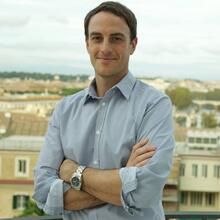A Reflection for Friday of the Fourth Week of Lent
Find today’s readings here.
So Jesus cried out in the temple area as he was teaching and said, “You know me and also know where I am from. Yet I did not come on my own, but the one who sent me, whom you do not know, is true.” (Jn 7:28-29)
I was on an airplane not long ago, sitting on the aisle with another passenger next to me. It was a long enough flight that I decided to pay for wifi and do some work. When my laptop connected and my browser page refreshed, a picture of Pope Francis filled the screen, donning his conspicuous white cassock and flanked by two clerics in black standing in the library of the Apostolic Palace.
(Aside: the picture is the main image for an article I highly recommend, written by my colleague Colleen Dulle, on how Cardinal Víctor Manuel Fernández is changing the Vatican’s doctrine office.)
To my fellow travelers who caught a glimpse, it was probably the most Catholic photograph imaginable. The pope, an all-male priesthood beside him, an opulent meeting room at the Vatican. In today’s popular imagination, what’s more Catholic than that?
In an instant, my heart sank into my chest and I felt a wave of anxiety run over me. I didn’t close or minimize the browser window—it would have taken too long to land my cursor on the tiny buttons at the top of the page. No, this was a real emergency that required maximum speed and stealth. Almost instinctively, I swiped the trackpad on my laptop and scrolled down the page until the image was completely gone from the screen. Exhale. No, not yet! The next thing I saw was a subheader that read, “Pope Francis’ instructions.” I quickly scrolled down further. I don’t think anyone saw it. Safe at last.
Why am I sometimes self-conscious about my association with the Catholic Church? It’s a complicated question. It’s not simply that I’m a terrible, self-hating Catholic. I love the church and my faith. I talk about it openly in my work at America and other circles. And at the same time, there are good reasons to be ashamed of the church in some respects.
At the same time, I’m also ashamed of my reactive self-consciousness. Maybe the photo would have made someone uncomfortable, maybe not. Does it matter? Should it matter?
Being conscious of our self-consciousness is a good thing. Longing to be Christians capable of detaching from it and moving beyond it is a grace and a sign of the presence of God in our lives. It is possible after all.
In John’s Gospel, Jesus knows who he is. He’s self-aware but not self-conscious. He stands out, but he’s tranquil on the inside. He knows what various people think of him, but it doesn’t change his self-understanding. His relationship with God is so deep that he is free, enabling him to accompany others into the same inner freedom.
John’s image of Jesus defines what it means to be Catholic much more effectively than the photograph of Pope Francis on my screen. It’s not that the two images are opposed, but that the first is much more essential than the second. This realization gave me great consolation at that moment. There I was, contemplating my relationship with God, reflecting on my journey and my inner freedom. The irony is that the photo made me more uncomfortable than anyone else. Perhaps the entire experience was a bit of divine creative genius; God calling me to an unexpected but very real moment of prayer.








